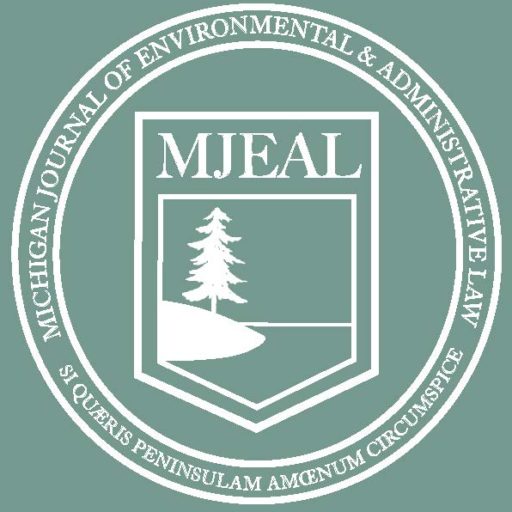E.E.O.C. Targets Artificial Intelligence: Is It Enough? Ryan Jansen INTRODUCTION Between sentient search engines and growing fears of academic dishonesty, artificial intelligence (“A.I.”) has been facing growing criticism.[1] In the employment context, A.I. use is already widespread: experts estimate that 79 percent of employers use A.I. in their hiring processes.[2] Despite mounting evidence that A.I.… Continue reading Jansen – Spring 2023
Author: mjeal-online
Hellum – Spring 2023
Creative Municipal Approaches to Lead Pipe Removal: A Pittsburgh Case Study Noah Hellum I. DOMINION v. PWSA AND THE PITTSBURGH LEAD CRISIS Lead pipes pose a serious threat to the public health of communities across the American Rust Belt. Early exposure to lead particles, even in small doses, can cause children to have serious cognitive… Continue reading Hellum – Spring 2023
Gordner- Spring 2023
Polluter Pays Principle Jillian Gordner The Polluter Pays Principle is a commonsense regulatory approach to managing the costs of pollution. The idea is that the industries that produce and profit from pollution should be responsible for the cost of cleaning it up.[1] Throughout the world, polluter pays policies have become an effective way of curbing… Continue reading Gordner- Spring 2023
Benham – Spring 2023
The Oil Lease Under the Flower Moon[1] Anna Benham What is, one might say, the tenuous link between a child custody case, bitterly fought, pending in the U.S. Supreme Court, and the regulatory and environmental threat to 56 million acres of Indian land under wherein bubbles vast and truly eye-watering reserves of liquid wealth? The… Continue reading Benham – Spring 2023
Avella – Spring 2023
The Social Cost of Greenhouse Gas Emissions Camille Avella In 2021, the largest expert survey to date on the economics of climate change revealed an overwhelming consensus that the costs of inaction are higher than the costs of action, and that immediate, aggressive emissions reductions are economically desirable.[1] The survey revealed that economic damages from… Continue reading Avella – Spring 2023
Allbery – Spring 2023
Will Michigan Ever Have Clean Drinking Water? A look into the state’s legislative struggles amidst the 3M lawsuit against Michigan’s PFAS water regulations Hannah Allbery Since 2014, Michigan residents, legislatures, and judges have been painfully aware that the state is infamous for the toxic, lead-polluted water that poisoned so many Flint residents.[1] In the wake… Continue reading Allbery – Spring 2023
Hersch – Spring 2023
Climate Change Infrastructure: People, Property, and Takings Ellison Hersch As municipalities implement infrastructure projects to mitigate and adapt to the effects of climate change they are expected to thread the needle between protecting the public good and protecting residents’ property and interests. Communities may need to sacrifice some private property to become more resilient in… Continue reading Hersch – Spring 2023
Hopkins – Spring 2022
Howling at the Government: The Fight to Get Wolves Back on the Endangered Species List Taylor Hopkins Introduction In Ojibwe, an Indigenous language spoken by the Anishinaabe people, the word for “wolf” is Ma’iingan.[1] When describing the significance of the wolf in Anishinaabe culture, Marvin Defoe, a member of the Red Cliff Tribe, said: “the… Continue reading Hopkins – Spring 2022
Klopfenstein – Spring 2022
Eminent Domain and Ethanol: Farmland Seizures and Carbon Sequestration in Iowa Ian Klopfenstein According to the U.S. Geological Survey (USGS), carbon sequestration is the process of capturing and storing atmospheric CO2.[i] This process occurs through natural processes like photosynthesis and biomass carbon banking, as well as through human-facilitated carbon capture and storage (CCS) operations.[ii] Artificial… Continue reading Klopfenstein – Spring 2022
Zhang – Spring 2022
It’s Time for a Carbon Tax Andrew Zhang Most Americans are worried about global warming.[1] Unfortunately, our actions do not reflect that worry. In 2019, 6,558 metric tons of carbon dioxide equivalents (the total global warming potential of all greenhouse gases adjusted to the potential of carbon dioxide) were emitted into the atmosphere from the… Continue reading Zhang – Spring 2022
